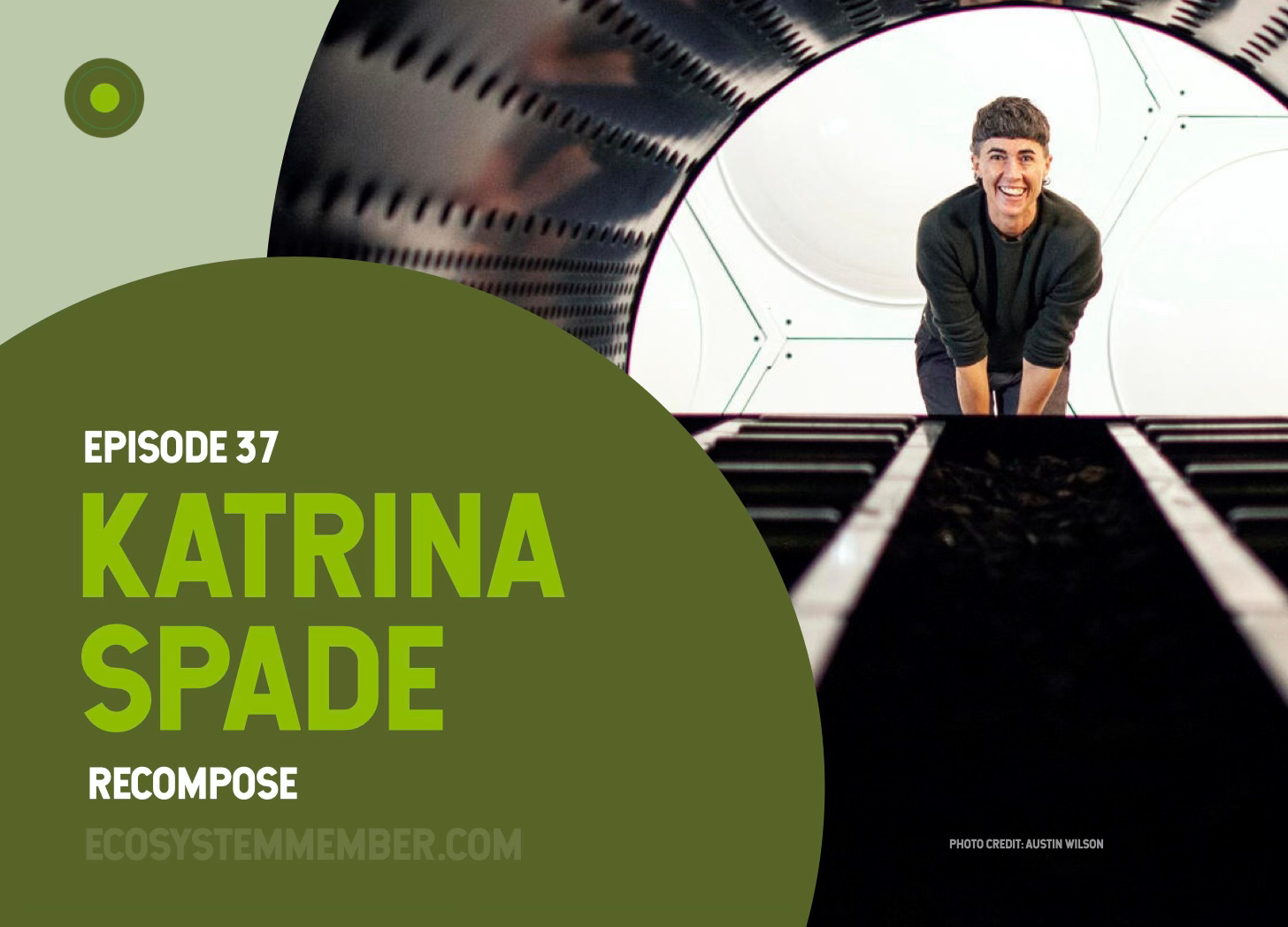Ep 37 / Redesigning Death with Katrina Spade, Recompose
Find out how Katrina is making death care a more intentional experience.
Not long ago, a friend visited us from New York City, planning to stay several days in the desert. But after her first night, we awoke in the morning and found her with her bags packed, standing at the front door. She had changed her plane ticket for an early return to Manhattan. Her last words to us as she left were “Aren’t you afraid you will be forgotten?”
What I wanted to say but didn’t was “I hope so.”
None of us see landscape the same.
Each of us finds our identity within the communities we call home. My delight in being forgotten is rooted in the belief that I don’t matter in the larger scheme of things, only that I tried my best to be a good human, failing repeatedly, but trying again with the soul-settling knowledge that my body will return to the desert.
Robin Wall Kimmerer tells the story of a beloved professor who had the initials NYS written behind his name. It stood for “not yet soil.” Amen.
From Erosion by Terry Tempest Williams
I was living in a flat where an art gallery curator used to live with my wife and cat in London when I first read this passage from Erosion. The flat sat in an industrial block of warehouses next to a major road and was converted from artist studios with our artist landlord having his studio and flat, and another flat for rent, downstairs. It was during the first or second COVD-19 lockdowns in England, I can’t really remember at this point.
There was nothing that looked like soil around us. I don’t even think you could spot a tree looking out one of our large, black-framed windows. Across the road and to the left was Millwall’s football stadium, directly across the road was a Millwall-themed cafe frequented by construction workers who picked up supplies from the many industrial shops nearby. It was a concrete setting in its purest sense with nothing organic visible, nothing changing without the force of tools and the human hand.
I turned to my wife and said I knew what my first tattoo would be - NYS.
I quickly read her the passage.
I remember saying something to her like ‘I think it works on multiple levels.’
First, I like the idea of death not being something to avoid at all costs but a universal eventuality that is anything but sad. Imagine becoming soil. Getting to nourish life. Completing the cycle. Maybe it doesn’t resonate the same for someone who has been or could become a mother capable of growing life inside oneself but for me, that seemed like something to celebrate at the end of a life well lived rather than avoid.
Second, it felt like an urgent call to action delivered with the wisdom of time. As long as I am not yet soil, I have time, space and ability to act.
So now, every day, I wake up and see NYS in simple black letters on my right wrist.
When I came across Recompose and the work that Katrina Spade has been doing over the last decade or so, I was similarly excited.
If you haven’t heard of Recompose, it is a green funeral home that specializes in human composting in Seattle, Washington. I am sure at least a few of you reading this recoiled after reading human composting, but as you’ll hear in the episode, it is actually kind of beautiful.
For a traditional burial, a dead body is filled with embalming fluid - a mixture of formaldehyde, glutaraldehyde, methanol, and other solvents that are not natural to the human body - and then put in a wood or metal casket before being lowered into an often concrete-lined grave. As a final act, the dead body is separated from the Earth by several layers and takes up land that isn’t in high supply in the urban environments we are increasingly living in.
Another option is cremation. Yet, in the burning process, it is estimated that up to 400kg of carbon emissions are released.
For me, both of these are terrible options. I’ve put so much time and effort into encouraging people to think more deeply about their relationship with nature and the more-than-human world that I can’t stomach the thought that my final act would separate me from or cause harm to the ecosystems I was part of.
As we talk about in the episode, Katrina designed a better way. With a tip from a friend about a method that farmers use to compost cows, she set off to use her experience in design and architecture to create a new, more intentional experience of death. Instead of becoming soil just being a metaphor, you can actually become soil with Recompose. One cubic yard of soil in fact.
In just about a handful of years, Recompose has already brought hundreds of people through the human composting process. With 13 states (Georgia ratified around the time of our episode recording) in the United States and Sweden legalizing the practice already, it is quickly moving into the mainstream giving more people the chance to actually become soil.
Watch/Listen to the Episode
Check Out Katrina’s TEDx Talk
Past Guest Update
Episode 31 of Ecosystem Member featured director Maja K Mikkelsen discussing the film she made of her parents called “The Last Observers”.
Every third hour, every day, for 36 years, her parents observed and recorded the weather at Sweden’s last manual weather station. However, the story is really about showing another way.
In recognition of her amazing film, Maja was just shortlisted for the prestigious Young Director Award.






